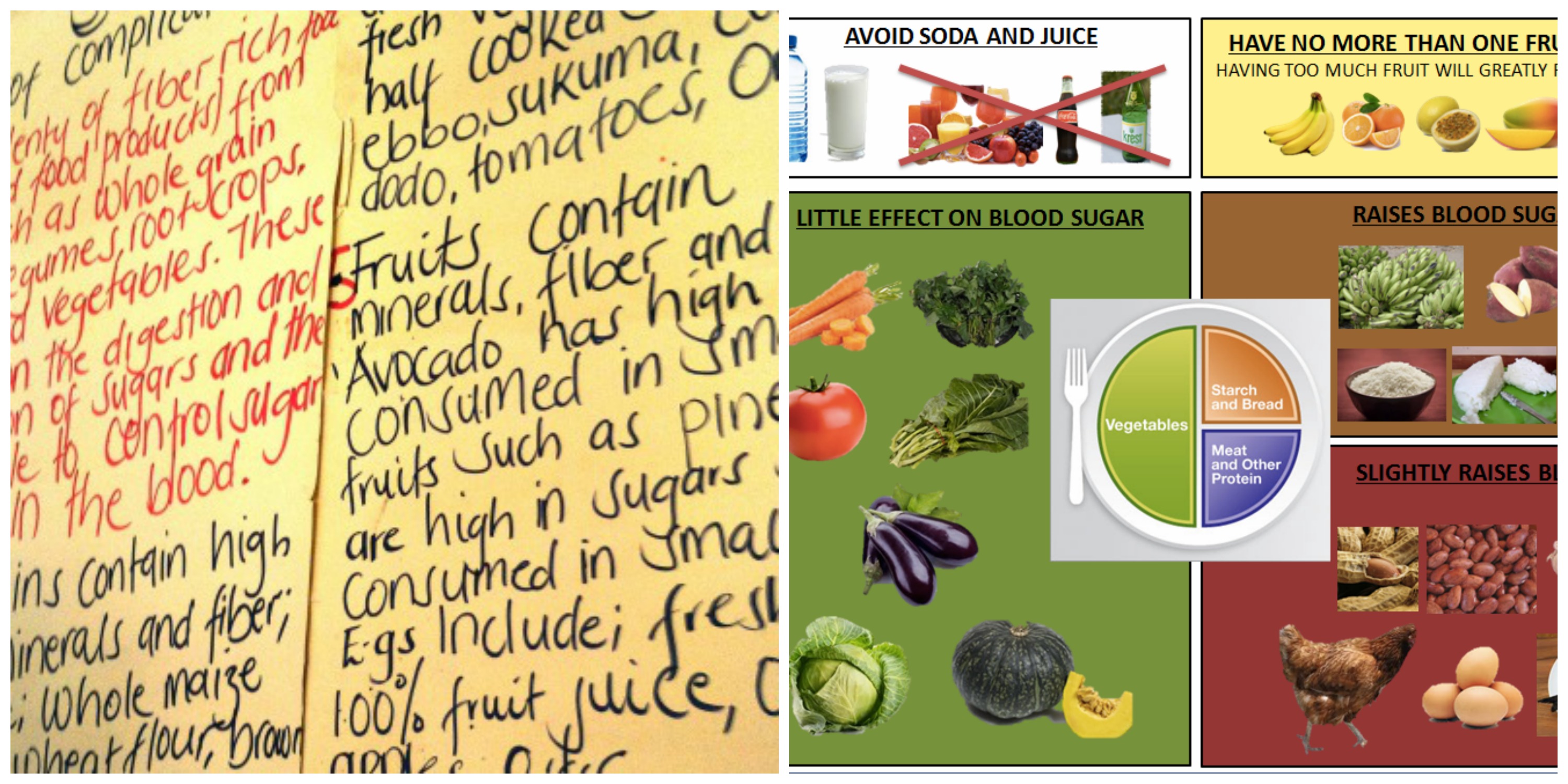Editors’ Note: This summer, six students from Albert Einstein College of Medicine traveled to Soroti, Uganda, as part of Einstein’s Global Diabetes Institute (GDI), to treat diabetes in a part of the world where 693,200 cases of diabetes were reported in 2014. This is the latest in our series of posts detailing the students’ experiences. In this one, second-year M.D. student Kelsey Wilson-Henjum shares what she learned in her efforts to educate patients about diabetes. The trip was funded by Einstein’s Global Health Fellowship Program.

(L-R) Previous patient education materials and those created by Einstein students in Uganda
I first noticed the misconceptions and confusion about diabetes in Soroti, Uganda, after a talk our program manager and I gave during our first week there. After we spoke, we took questions from the audience of approximately 100 patients waiting to be seen at a diabetes clinic. It was clear that there was a lack of understanding about diabetes. Still, it was inspiring to see that these patients were highly motivated to learn more about the disease, which has had such a profound impact on their communities.
Diabetes Management and the Power of Patient Education
Patient education is an essential component of diabetes management. It allows people with the condition greater control over their illness and helps them avoid diabetes-related disruptions in their daily lives. I found this to be particularly true in a resource-limited setting such as Soroti. If patients have a good understanding of the complications associated with the disease—and the lifestyle modifications that help lower sugar levels—they can be empowered to better manage the illness. In fact, Dr. Wilson Etolu, the head of the diabetes clinic at Soroti Regional Referral Hospital, acknowledged this by making the expansion and improvement of patient education a top long-term priority for the clinic.
We were fortunate enough to contribute to this effort by helping Dr. Etolu and the hospital staff develop a diabetes patient-education curriculum that focused on four key topics: nutrition, hypoglycemia, medication administration and diabetic foot care. We contributed talking points for each subject to be discussed in patient-education sessions and helped develop pamphlets for the patients to take home. And in order to evaluate the efficacy of the curriculum, we created tests for patients to take before and after each subject was covered.
Diabetes: Education and Cultural Factors
It is important to keep in mind that effective diabetes management is highly dependent on environmental and cultural factors. In Uganda, there are many challenges to controlling diabetes. For example, starches and other carbohydrate-laden foods dominate the average diet, and the variety of available food is limited depending on the season. We worked hard to account for these specific factors so that the curriculum would be culturally relevant and applicable to the patients’ lives.
Many patients told us that they had not been aware that certain foods and drinks, such as matoke (plantains) and soda, are high in sugar. One man told us that he started checking his feet regularly for injuries and cutting his toenails with a toenail clipper instead of a razor after attending a session on diabetic foot injuries. It appeared that the patients were internalizing some of the information and it was encouraging to receive such feedback.
There are also challenges with patient education. For instance, during one of our home visits, we spoke with a woman who was trying to completely eliminate carbohydrates from her diet and was experiencing symptoms of hypoglycemia. It was a stark reminder that our actions can have unintended consequences and that there are often difficulties communicating effectively with patients. This experience also highlighted the importance of partnering with patients and the community to ensure that well-intentioned ideas come to fruition.
In Soroti, many patients are highly invested in learning more about diabetes management, and I am confident that the education curriculum can be a sustainable way to improve their overall well-being. However, working with the local health workers and incorporating feedback to hone messages will be critical in ensuring that the patient-education curriculum is a long-term success.

